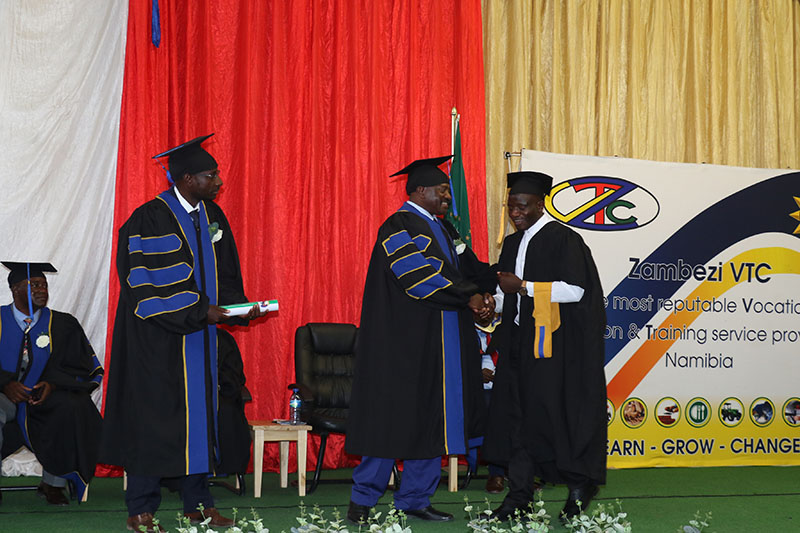Marythar Kambinda
KATIMA MULILO – The Zambezi Vocational Training Centre (ZVTC) graduated 302 students this week and their families celebrated their graduation at Kamunu hall in Katima Mulilo.
The institution held its graduation ceremony under the theme: ‘TVET, Transformation for Economic Development’.
The occasion saw students graduating in various fields including agriculture; crop production and farm machinery, bricklaying and plastering, clothing production, hospitality and tourism, joinery and cabinet making, office administration, plumbing and pipe fitting as well as welding and metal fabrication.
Valedictorian Pumulo Maswahu highlighted the excellent education that she and others have received at ZVTC, which has given them a solid stepping stone for their future.
“I challenge you all to take everything that you have learned, from every experience and conversation with you into the real world. Continue to make progress wherever you find yourself and may this institution always continue to produce more graduates,” she said.
Ephraim Shamalaza could not contain his excitement about being one of the graduates of ZVTC in agriculture and crop production.
He stated that he still aims to pursue an academic career with more qualifications to come in the near future.
Zambezi governor Lawrence Sampofu, who read the Minister of Higher Education’s, Training and Innovation Itah Kandjii-Murangi’s speech, emphasised the significance of the moment in the lives of the graduates, as they get to experience and celebrate the culmination of their individual sacrifice, dedication, personal commitment and hard work.
She noted that under the leadership of Richard Kambinda, the centre manager, ZVTC continues to grow in leaps and bounds, not only in terms of its overall intake capacity, but in terms of its training course portfolio.
A key tenet of the message at all graduation ceremonies of VTCs at these occasions was that of entrepreneurship, sending challenges to the young men and women to apply their skills and knowledge towards becoming job creators, instead of jobseekers, said the minister.
Kandjii-Murangi said the graduates are equipped with work-ready skills. Those of you who will not be able to land employment, which has become even more challenging in the current economic climate, would be able to create jobs for themselves.
“Graduates of technical and vocational education and training are better equipped to start their own business,” said Kandjii-Murangi.
She reiterated the importance of the TVET programmes on offer at public VTCs, which are yielding significant amounts of graduates and that the sector is growing in stature as a critical supply channel of the technical and vocational skills needed to drive productivity in the economy.
Chairperson of the Katima Mulilo Town Council management committee, John Ntemwa read a statement on behalf of the mayor Lister Shamalaza.
He stated that the culmination of many years of hard work and dedication had led to the special occasion, of which the town council is happy to be part.
“We look forward to the institution producing many more cohorts of highly skilled and competent graduates, who are able to enter the world of work with confidence, focused on making a difference in the lives of their families, their communities, this region, and the country at large,” said Shamalaza. He further stressed that investment in human resources through education, training and other forms of learning was essential to achieving smart, sustainable and inclusive growth.
“TVET will continue to play an important role in the shift towards a more knowledge-intensive society,” he stated.
Martin Lutangu from Katima Mulilo Town Council reminded the graduates of the importance of vocational skills. He further encouraged them to create their own jobs if they do not find work.
Kambinda, the centre manager, congratulated the students and further encouraged them on ensuring that this graduation ceremony would not be the last in their educational journey, instead, “let it open more doors of opportunities in your different educational spheres”.



